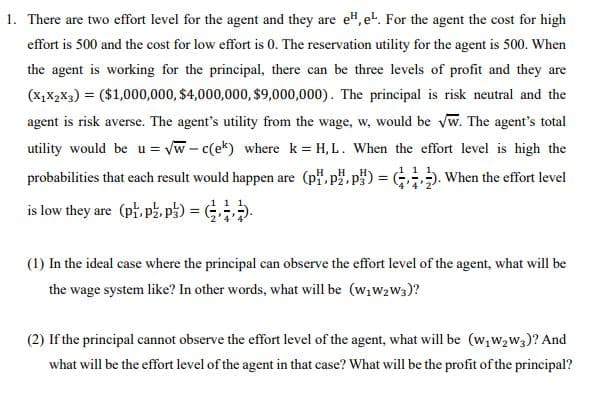1. There are two effort level for the agent and they are e", e". For the agent the cost for high effort is 500 and the cost for low effort is 0. The reservation utility for the agent is 500. When the agent is working for the principal, there can be three levels of profit and they are (x,x2x3) = ($1,000,000, $4,000,000, $9,000,000). The principal is risk neutral and the agent is risk averse. The agent's utility from the wage, w, would be vw. The agent's total utility would be u = vw- c(ek) where k H,L. When the effort level is high the probabilities that each result would happen are (p",p, p") = G5. When the effort level %3D is low they are (ph, p%, p) = ÷.; 5. (1) In the ideal case where the principal can observe the effort level of the agent, what will be the wage system like? In other words, what will be (w,W2W3)?
1. There are two effort level for the agent and they are e", e". For the agent the cost for high effort is 500 and the cost for low effort is 0. The reservation utility for the agent is 500. When the agent is working for the principal, there can be three levels of profit and they are (x,x2x3) = ($1,000,000, $4,000,000, $9,000,000). The principal is risk neutral and the agent is risk averse. The agent's utility from the wage, w, would be vw. The agent's total utility would be u = vw- c(ek) where k H,L. When the effort level is high the probabilities that each result would happen are (p",p, p") = G5. When the effort level %3D is low they are (ph, p%, p) = ÷.; 5. (1) In the ideal case where the principal can observe the effort level of the agent, what will be the wage system like? In other words, what will be (w,W2W3)?
Managerial Economics: A Problem Solving Approach
5th Edition
ISBN:9781337106665
Author:Luke M. Froeb, Brian T. McCann, Michael R. Ward, Mike Shor
Publisher:Luke M. Froeb, Brian T. McCann, Michael R. Ward, Mike Shor
Chapter19: The Problem Of Adverse Selection
Section: Chapter Questions
Problem 1MC
Related questions
Question

Transcribed Image Text:1. There are two effort level for the agent and they are e", et. For the agent the cost for high
effort is 500 and the cost for low effort is 0. The reservation utility for the agent is 500. When
the agent is working for the principal, there can be three levels of profit and they are
(x,X,x3) = ($1,000,000, $4,000,000, $9,000,000). The principal is risk neutral and the
agent is risk averse. The agent's utility from the wage, w, would be vw. The agent's total
utility would be u = vw - c(ek) where k = H, L. When the effort level is high the
probabilities that each result would happen are (p, p", p) = G. When the effort level
is low they are (p, p, p) = (;-
(1) In the ideal case where the principal can observe the effort level of the agent, what will be
the wage system like? In other words, what will be (w;w2w3)?
(2) If the principal cannot observe the effort level of the agent, what will be (w,w,w3)? And
what will be the effort level of the agent in that case? What will be the profit of the principal?
Expert Solution
This question has been solved!
Explore an expertly crafted, step-by-step solution for a thorough understanding of key concepts.
This is a popular solution!
Trending now
This is a popular solution!
Step by step
Solved in 2 steps

Knowledge Booster
Learn more about
Need a deep-dive on the concept behind this application? Look no further. Learn more about this topic, economics and related others by exploring similar questions and additional content below.Recommended textbooks for you

Managerial Economics: A Problem Solving Approach
Economics
ISBN:
9781337106665
Author:
Luke M. Froeb, Brian T. McCann, Michael R. Ward, Mike Shor
Publisher:
Cengage Learning


Managerial Economics: A Problem Solving Approach
Economics
ISBN:
9781337106665
Author:
Luke M. Froeb, Brian T. McCann, Michael R. Ward, Mike Shor
Publisher:
Cengage Learning
